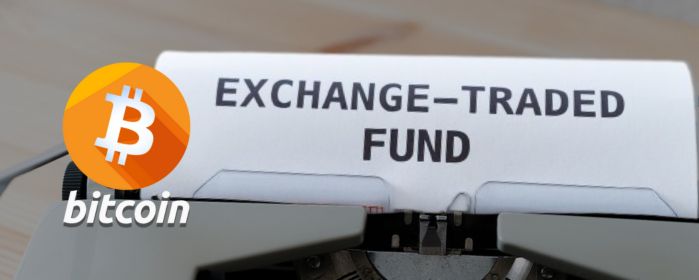The question that has been on everyone’s mind lately is exactly what is a Bitcoin ETF. A Bitcoin ETF is a type of investment product that tracks the price of the most valuable digital currency in the world. It allows investors to participate in the Bitcoin market without having to buy, store, or secure any Bitcoins themselves.
What are Bitcoin ETFs?
A Bitcoin ETF is a type of fund that tracks the price of Bitcoin. Unlike cryptocurrency exchanges, bitcoin ETFs can be accessed through regular stock market platforms. This makes it easier and safer for mainstream investors and speculators to get exposure to the price of bitcoin without having to deal with the technicalities of owning and storing bitcoin.
Bitcoin ETFs are not a new concept and are similar to other types of ETFs that track the value of various assets and industries, such as commodities and currencies, or that focus on specific themes, such as environmental or social issues.
However, the U.S. has not yet approved a spot bitcoin ETF, which is a fund that holds actual bitcoin (BTC) as its underlying asset. The only option for U.S. investors is to invest in bitcoin futures ETFs, which are funds that hold bitcoin derivatives contracts that bet on the future price of bitcoin.
The approval of a spot bitcoin ETF would increase the diversity and accessibility of bitcoin investment options in the U.S. BlackRock, a large asset management company, could be applying for a spot bitcoin ETF, which has sparked hope and excitement among bitcoin enthusiasts.

Pros and Cons of Investing in Bitcoin ETFs
A Bitcoin ETF would make it easier for people to invest in the cryptocurrency without having to deal with the technical aspects of owning and storing it. Some of the advantages of a Bitcoin ETF are:
- Simplicity: An ETF can be bought and sold on a regular stock exchange, without having to learn how to use a crypto wallet or sign up for a crypto platform.
- Indirect exposure: An ETF tracks the price of bitcoin, but does not give investors direct ownership of the asset. This means they can benefit from the price movements without having to worry about the security and tax implications of holding Bitcoin.
- Diversification: An ETF can hold multiple assets in one fund. A bitcoin ETF could include not only bitcoin but also other bitcoin-related assets, such as stocks of companies that mine or use bitcoin. This would give investors more options to diversify their portfolios across different markets and sectors.
A bitcoin ETF has some notable advantages, but it also comes with some limitations that one should be aware of:
- Costs: ETFs usually charge management fees that are deducted from the fund, meaning that some of the money in the pool is used to pay the people/company running the fund. Look at the “expense ratio” of an ETF before investing – you want it to be as low as possible, ideally below 1%.
- No direct bitcoin ownership: A bitcoin ETF does not give holders the ability to exchange or transfer the asset, as they only have exposure to its price movements.
- Less flexible trading hours: Crypto can be traded anytime, but financial exchanges like the New York Stock Exchange (NYSE) are open only Monday to Friday from 9:30 a.m. ET to 4 p.m. ET, so you can’t react to significant changes in BTC’s price overnight until the market opens again.
- Delayed pricing: A bitcoin ETF may not track the bitcoin price accurately in real-time, especially if the ETF has other holdings besides bitcoin.

Why is Bitcoin ETFs Needed
One of the reasons why Bitcoin is not more widely adopted by investors is the perceived complexity and uncertainty of the crypto ecosystem.
To own Bitcoin, one needs to have a secure way of storing it, such as a Bitcoin wallet, and to rely on crypto exchanges, which are platforms that facilitate the buying and selling of cryptocurrencies. These aspects can be daunting for those who are not familiar with how they work and what risks they entail.
Additionally, the legal status and regulation of Bitcoin and other cryptocurrencies vary across different countries and regions, which can create confusion and unpredictability for investors who want to diversify their portfolio with crypto assets.
If you own Bitcoin, you have to take care of your own security and keep your private keys away from hackers or thieves (unless you trust the exchange to do that for you). This might require investing in a hardware wallet to safeguard your Bitcoin or finding a safe way to store your private keys. You also need to figure out how to report any profits from selling Bitcoin on your tax returns.
A Bitcoin ETF simplifies the process of investing in the cryptocurrency market. Instead of buying and holding crypto, which requires dealing with private keys, storage, or security issues, investors can own shares in the ETF that track the price of Bitcoin. This way, they can benefit from the market movements without having to worry about the technical aspects of crypto ownership.

How Do Bitcoin ETFs Work?
A Bitcoin ETF is a way to invest in Bitcoin without buying and storing it yourself. It works like this: a company buys a large amount of Bitcoin and keeps it in a secure location. The company then issues shares of the ETF on a regular stock exchange, and you can buy and sell them as you would any other stock. A Bitcoin ETF lets you benefit from the price movements of Bitcoin and also allows you to short-sell it if you think it will go down.
However, a Bitcoin ETF is not exactly the same as other ETFs.
For one thing, most ETFs track a basket of stocks, such as the S&P 500, and give you a share of the profits that those stocks make. For example, if Tesla pays a dividend and you own an ETF that includes Tesla, you get a (smaller) dividend too. But Bitcoin is not a company, so it does not pay dividends or profits to anyone. A Bitcoin ETF only reflects the value of the Bitcoin it holds.
For another thing, you have to pay fees to the company that runs the ETF. These fees include the costs of buying and storing the Bitcoin, as well as the management and administration of the ETF. These fees can reduce your returns from investing in a Bitcoin ETF.

How a Bitcoin ETF Compares to Holding Bitcoin Directly?
This question depends on the individual investor’s goals and preferences. Some may find a bitcoin ETF more suitable, as it provides exposure to the price movements of BTC without requiring actual ownership. This can be appealing to passive investors, bitcoin skeptics, or portfolio diversifiers.
Others may prefer to own Bitcoin directly, as it allows them to trade frequently, use BTC as a medium of exchange, or explore other aspects of the cryptocurrency space. To own Bitcoin, one needs to buy it from a source that verifies their identity, such as an exchange, broker, or ATM. However, spot bitcoin ETFs are not yet approved by the SEC. Futures-based ETFs are available, but they may not meet everyone’s needs.

